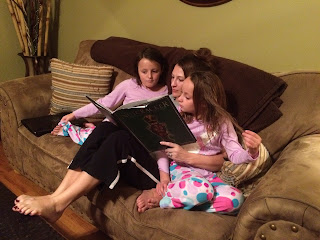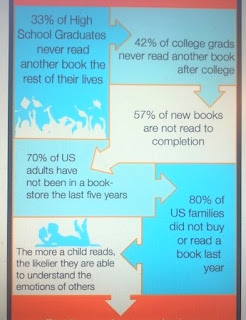However, assuming your resolution to read more books is going to be solitary reading, there are many good reasons for you to make a New Year's reading pledge. I will share just a few of those reasons.
42% of college grads never read another book after college.
Last week's blog described two friends who read to relax at bedtime in one case and to just pass the time without any particular reason in another case. There is nothing wrong with reading to reduce stress. Personally, even if I am reading to relax, I still prefer to read something of value to me, so I keep a book of poetry beside my bed which serves that purpose well. The rhythm of poetry and the shorter length, which makes it easier to find a stopping place, are both reasons why poetry is especially restful and relaxing. Often the substance of the poems offer content for reflection as I fall asleep. In a similar category, reading can be inspiring, whether read at bedtime or any other time. Reading about the achievements or courage or good deeds of others can be an inspirational reason for reading.
The more a child reads, the better they are able to understand the emotions of others.
 |
| Photo Credit: Lyn Fenwick |
Three hundred years ago, Joseph Addison described another important reason for reading: "Reading is to the mind what exercise is to the body." Studies have shown that reading really does increase the blood flow and improves connectivity in the brain. It is not just what you learn by reading but also an actual physical impact.
80% of U.S. families did not buy or read a book last year.
Obviously, reading can provide information that can alter your thinking. Right now, with health issues limiting travel, we can still learn about other people and other places through books. Books can even take us back in history. Mark Twain wrote that history may not repeat itself, but it does rhyme. Instead of every generation needing to learn hard lessons for themselves, reading can spare the mistakes and build on the achievements.
70% of U.S. families have not been inside a bookstore in the past 5 years.
Children are not alone in benefitting from reading books that challenge their imaginations. Fiction authors of the 1800s are believed to have inspired and challenged inventors and scientists who read their books and made fantasy into reality. How many young boys credit reading a book about an athlete as what made them believe they too could run faster, jump higher, or enter a sport that they believed had been closed to them because of a disability or their color or financial limits. How many people have built something or written something or baked something or explored something because they were inspired by a book they read, and age need not be a barrier to readers inspired by a book.
I do not know the source of the statistics I quoted. Frankly, I hope they are wrong, because I cannot imagine not wanting to continue reading for a lifetime. But, I do know that other sources support the severe reduction in reading, and I know too many bookstores closed because people stopped buying books.
Whether you read to relax, to be inspired, to be educated, to learn, to improve something about yourself, to gain confidence--and I am not referring to "self-help" books but rather well written books that appeal to you for many reasons, I hope you believe that reading is worth making time to read.













